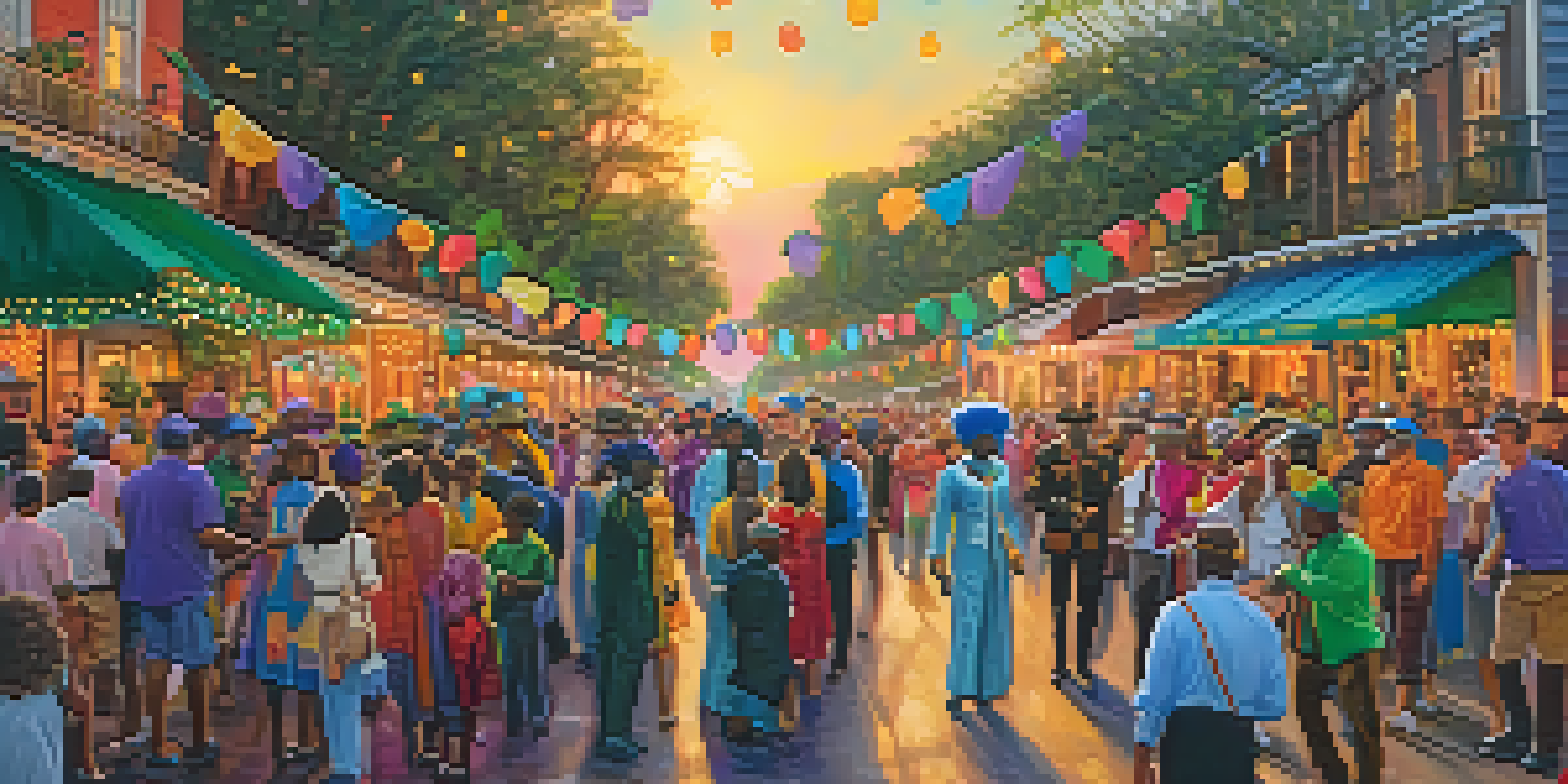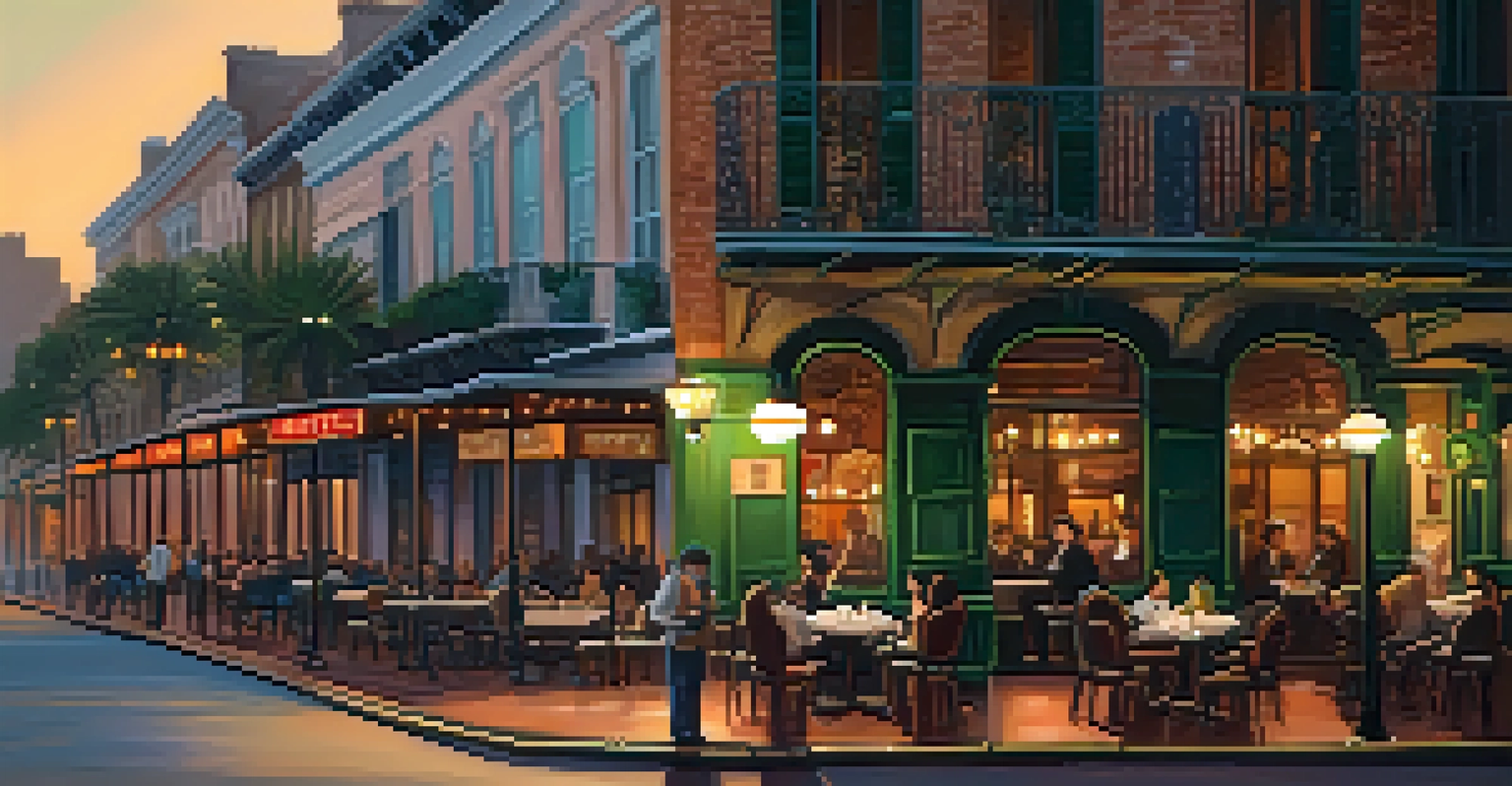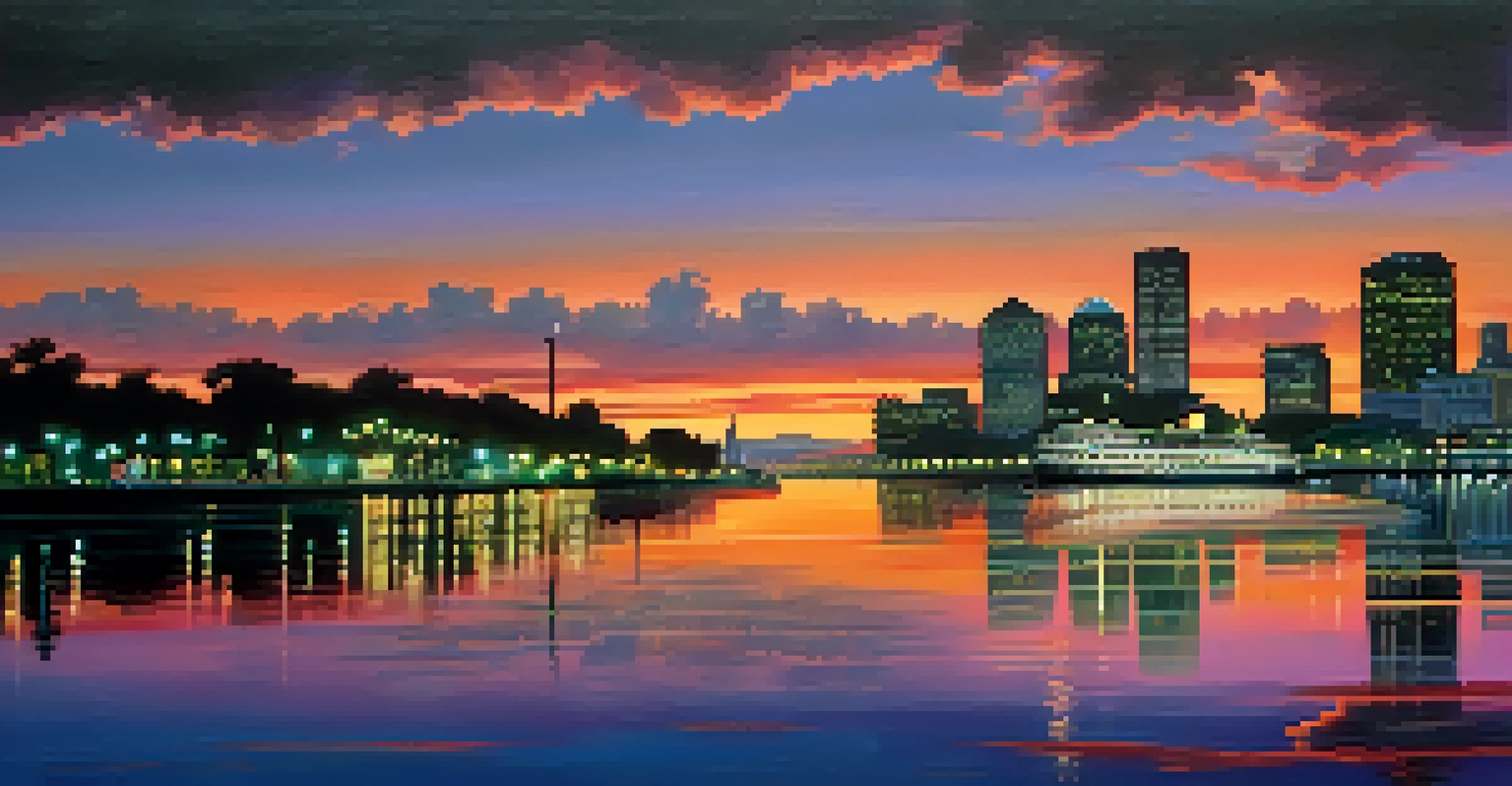New Orleans' Influence on Modern American Literature

The Birthplace of Literary Innovation: New Orleans
New Orleans, with its rich history and vibrant culture, serves as a fertile ground for literary innovation. Writers flock to this city, drawn by its unique blend of cultures, traditions, and stories waiting to be told. The diverse influences found in New Orleans' neighborhoods create a tapestry of narratives that inspire both seasoned authors and aspiring storytellers alike.
New Orleans is a city that is not only rich in history but also rich in stories waiting to be told.
One can't overlook the impact of the city's jazz and blues scenes, which permeate the literary landscape. Much like a jazz musician improvises, writers in New Orleans often play with language and form, resulting in fresh and unexpected prose. This creative freedom nurtures a bold literary style that both reflects and challenges societal norms.
Moreover, the city's historical significance, from its colonial past to the civil rights movement, provides a wealth of material for authors. Writers can delve into themes of identity, struggle, and resilience, making their work not just a reflection of New Orleans but also a commentary on the broader American experience.
The Influence of Southern Gothic Literature
Southern Gothic is a literary genre that thrives on the haunting beauty of decay, and New Orleans is its epicenter. This style often explores the grotesque and the eccentric, making it a perfect match for the city's enigmatic aura. Writers like Tennessee Williams and Anne Rice have drawn heavily on the city's unique atmosphere to create compelling narratives filled with complex characters.

The Southern Gothic tradition allows authors to address deeper societal issues, such as racism, classism, and the struggle for personal redemption. In New Orleans, these themes resonate particularly well, as the city’s history is rife with contradictions and conflicts. The juxtaposition of beauty and decay invites readers to look beyond the surface, engaging them in a more profound exploration of the human condition.
Literary Innovation in New Orleans
New Orleans' rich cultural tapestry inspires writers, fostering innovative storytelling that reflects the city's unique identity.
Through the lens of Southern Gothic, modern authors continue to build on this foundation, creating works that reflect contemporary issues while echoing the past. The legacy of this genre is evident in the writing styles and themes of many current authors who draw inspiration from the city’s rich, albeit tumultuous, history.
Diverse Voices: The Rise of Multicultural Narratives
New Orleans is a melting pot of cultures, and this diversity is mirrored in its literature. Writers from various backgrounds contribute to a rich narrative tapestry, offering perspectives that reflect the city's complex identity. This multiculturalism enhances the literary landscape, allowing for stories that resonate with a broad audience.
The South is a region of the imagination, and New Orleans is the capital of that imagination.
Authors like Jesmyn Ward and Tom Piazza highlight the experiences of marginalized communities, shedding light on issues often overlooked in mainstream literature. Their work not only enriches American literature but also fosters a greater understanding of the diverse fabric that makes up the nation. These narratives challenge readers to confront uncomfortable truths while celebrating the resilience of the human spirit.
The city's festivals, traditions, and celebrations serve as backdrops for many of these stories, further grounding them in the unique cultural context of New Orleans. As modern American literature evolves, the voices rising from this city continue to shape and inspire the broader narrative of what it means to be American.
The Impact of New Orleans on Poetry and Spoken Word
New Orleans' lively spoken word scene has significantly influenced contemporary poetry. The city's cultural events like Mardi Gras and Jazz Fest create an atmosphere ripe for artistic expression, where poets can share their work in dynamic settings. This vibrant exchange fosters a unique style of poetry that blends rhythm, performance, and storytelling—much like the city's own musical heritage.
Prominent poets like Natasha Trethewey and Rita Dove have drawn inspiration from the essence of New Orleans, weaving the city's rhythm and life into their work. Their poetry often reflects the emotional depth and complexity of living in a culturally rich environment, capturing the spirit of the city and its people. This connection between poetry and place emphasizes the importance of local culture in shaping literary voices.
Southern Gothic's Deep Roots
The Southern Gothic genre thrives in New Orleans, exploring themes of decay and societal issues through its complex narratives.
The spoken word movement has also made poetry more accessible, encouraging a new generation of writers to find their voice. As more poets emerge from New Orleans, they carry with them the city's heartbeat, infusing their work with the passion and vibrancy that define this unique city.
Influential Literary Figures from New Orleans
New Orleans has been home to many influential literary figures who have left an indelible mark on American literature. Writers like William Faulkner, whose Southern roots deeply influenced his work, often drew inspiration from the city's atmosphere and history. His complex characters and intricate narratives reflect the struggles of life in the South, a theme that resonates in much of modern American literature.
Another notable figure is Kate Chopin, whose groundbreaking novel 'The Awakening' explores themes of female identity and independence. Set in Louisiana, her work captures the essence of the region while addressing universal issues. Chopin's influence can still be felt today, as contemporary authors tackle similar themes of self-discovery and liberation.
These literary giants paved the way for future generations of writers, demonstrating the power of place in shaping narrative. Their contributions remind us that New Orleans is not just a backdrop for stories but a character in its own right, influencing the voices and themes explored in modern literature.
Literature as a Reflection of New Orleans' Identity
The literature emerging from New Orleans often serves as a mirror reflecting the city's multifaceted identity. Writers use their work to explore the complexities of life in a city known for its vibrant celebrations and deep-rooted struggles. This exploration of identity resonates with readers, as it effectively captures the essence of what it means to live in a place rich with history and culture.
Through their narratives, authors address the challenges faced by the city, including poverty, crime, and social inequality. Yet, they also celebrate the resilience and spirit of the people who call New Orleans home. This duality creates a nuanced portrayal that invites readers to engage with the city's realities, fostering empathy and understanding.
Emerging Diverse Voices
The city's multicultural environment leads to a rise in diverse literary voices, enriching American literature with new perspectives.
Ultimately, the literature produced in New Orleans transcends geographical boundaries, speaking to universal themes that resonate with readers everywhere. As modern American literature continues to evolve, the city's identity remains a significant influence on the stories being told and the voices being amplified.
The Future of New Orleans Literature
As we look to the future, the literary scene in New Orleans is poised for further evolution. New voices are emerging, bringing fresh perspectives and innovative storytelling techniques that reflect contemporary issues. The city’s ongoing cultural vibrancy ensures that it will remain a hotspot for literary creativity for years to come.
Moreover, with the rise of digital platforms and self-publishing, authors from New Orleans can now share their stories with a global audience. This accessibility allows for a wider range of voices to be heard, enriching the literary landscape even further. The fusion of tradition and modernity in storytelling reflects the dynamic nature of the city itself.

In conclusion, the influence of New Orleans on modern American literature is profound and enduring. As writers continue to draw inspiration from the city's rich tapestry of culture and history, the narratives that emerge will shape the future of literature, ensuring that the spirit of New Orleans remains alive and well in the written word.